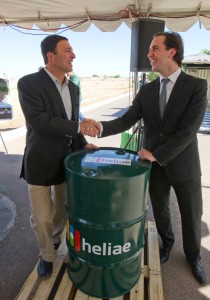Secretary Salazar and Senator Murkowski will be keynoting an Energy Forum sponsored by Arent Fox and the George Washington University on June 5 in Washington, DC. [Read more…] about Energy Policy Forum with Dept. of Interior Secretary Ken Salazar and U.S. Senator Lisa Murkowski
Tribe Looking to the Future with Algae
As the algae industry gets closer to large-scale production, the skills to research the technology, build and operate algae farms, and harvest algal oils will be in high demand.
The U.S. Department of Energy tells the story of how the Crow Tribe in Montana is jumping on the skill-sets found in the algae industry to help spur local economic growth, education, and renewable supplies of domestically-produced energy.
Several DOE programs bring together regional universities, laboratories and companies such as Algal Biomass Organization member Accelergy to give students the opportunity to learn the new skills in a professional work setting.
One internship specifically devoted to algae places students in a laboratory setting, evaluating algae samples and their use in energy applications. The students focus on Accelergy’s technology that uses feedstocks such as coal or biomass from algae to produce transportation fuels. During last summer’s program, students collected algae at pond sites, built bioreactors to grow the algae, harvested the algae, and then freeze-dried their samples to check the algae for oil quantities that could be useful for Accelergy’s technology.
Students in this successful program are going on to related careers, and since tribal lands are often well-suited for algae cultivation it is likely many of them will be contributing to the industry in the near future.
More details about the program, and how it is being continued this summer, can be read in this DOE Techline.
Energy is a Cash Crop
On Friday May 18th the House Agriculture Subcommittee on Conservation, Energy and Forestry held a hearing on the Energy Title of the 2012 Farm Bill. It is still unclear if the Farm Bill will include mandatory funding for programs that can accelerate the commercialization of advanced biofuels, such as those from algae.
Agriculture has become an important player in America’s energy future, and algae are unique among biofuel feedstocks because they can produce many types of fuel, don’t impact other agricultural lands, and don’t require potable water resources.
ABO submitted testimony at Friday’s hearing detailing the importance of an Energy Title to the industry’s progress, jobs and American energy independence. Among ABO’s points:
- In a January 2012 industry survey, 88% of those surveyed said that “stable and supportive federal policy would accelerate development of the algae industry.” Eliminating the Energy Title of the Farm Bill would be a significant break in “stable and supportive federal policy,” inevitably putting the many thousands of existing jobs in the algae and other biofuels industries at risk.
- An Energy Title will incentivize private investment in the algae industry, which will, in turn, expedite commercialization of algae-based fuels that can be produced right here in America.
- Public and private investment in algae and other feedstocks result in job creation in rural America.
ABO’s testimony includes specific examples of how these kinds of programs spur development and private investments in the algae industry.
As the Farm Bill continues to be debated in the House and Senate it will be important for members of Congress to hear that they should not eliminate the Energy Title from the Farm Bill. Doing so would have a devastating effect on this promising industry, on the jobs it is creating, and our nation’s future energy dependence.
Today’s Algae Industry
As the news of Heliae’s recent groundbreaking demonstrates, the algae industry is growing. In the video below, Mary Rosenthal, ABO’s executive director, describes the impact algae is having on jobs and the economy across the United States.
Heliae Breaks Ground on Algae Demonstration Facility
This weekend ABO member Heliae, an algae technology company based in Arizona, broke ground on a new commercial demonstration facility. The facility in Gilbert, Arizona will showcase the company’s technology platform for partners that will grow and harvest algae for commercial applications.
Ultimately these applications will be in fuel markets, but co-products such as feed, fertilizers, cosmetics and nutrition products will be significant source of the industry’s early revenues.
Ken Silverstein at Forbes leads a great article on the industry’s direction with the Heliae groundbreaking.
The Arizona Republic describes more about the weekend events at Heliae, and the company’s unique approach to growing algae.


